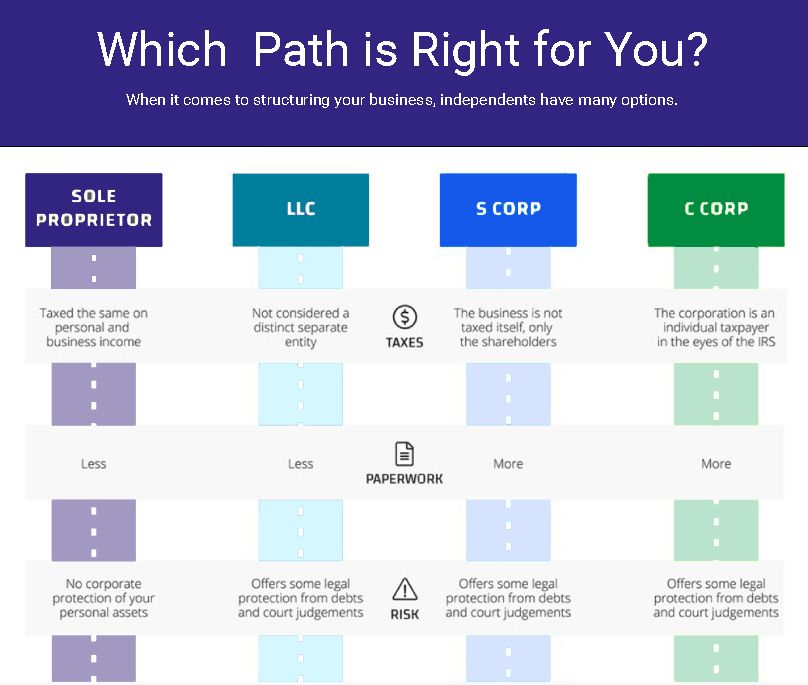How to Choose the Best Legal Structure for Your Small Business

- The best business structure for your business will depend on many factors.
- The four business structures to choose from are Sole Proprietor, LLC, C-Corp, and S-Corp.
- Review the advantages and disadvantages of each structure to choose the best option for your small business.
Deciding how to structure your business is an important consideration—one that can carry tax and compliance implications. The best business structure for you will depend on many factors, including how you plan to take and maximize deductions, what type of businesses you work with, and if you intend to grow your business in the future.
What is a Legal Business Structure?
A business structure is the legal structure of an organization that is recognized in each jurisdiction for a business category. The type of legal structure you choose determines the extent to which you can participate in certain activities such as raising capital and the amount of taxes you pay. The structure also influences the day-to-day operations of your business. It defines who owns the company, how profits are distributed, and who is responsible for performing which tasks. The structure also determines how the business will be taxed and the responsibilities of managers and owners in the event of a lawsuit.
The following four structures are discussed with the following assumptions:
- Your business has one owner with no additional shareholders
- You are the provider of professional services and not products
- You do not require investors
- You wish to keep business administration to a minimum
- You do not have a need for a Board of Directors
- You wish to minimize legal and tax exposure
4 Types of Business Structures for Small Business
Each of the four business structures below has advantages and disadvantages and has tax implications that need to be considered. As you read through the options, consider your future plans for your business, how flexible you need to be, and the responsibilities you are willing to undertake.
1. Sole Proprietor
Many independents begin their journey as sole proprietors. For tax purposes, you generally operate under your personal Social Security number, but you can apply for a Taxpayer Identification Number (TIN) for your business by filing an IRS SS-4 asking for an Employer Identification Number (EIN) as your TIN instead of using your personal Social Security number.
The business is generally run under your legal name. If you want to give the business an alternate name, you’ll register a Doing Business As (DBA) to state the name you intend to give your business. This process lets your state or local government know the name you are operating your business under. Specific DBA registration rules vary from state to state. You may also apply for a Federally registered business trademark or trade name.
Sole Proprietor advantages:
- Sole Proprietors file on a Schedule C (quarterly) but are taxed the same on their personal and business income. Filing only one form each year means less paperwork and hassle.
- Provides flexibility for those still fully employed and freelancing only part-time.
Sole Proprietor disadvantages:
- Does not offer corporate protection of your personal assets. This means there is no legal difference between you and your business assets. If you are sued or go bankrupt, your personal assets are attached to your business and will be available to debtors.
2. Limited Liability Company (LLC)
Originally designed to protect owners of a business from certain business-related liabilities, the LLC structure has since become popular for independents due to its simplicity, yet strong legal protections of a corporation shielding your personal assets. Think of it as the next step above a sole proprietorship.
LLC advantages:
- Simple and inexpensive to set up; requires less paperwork than C and S Corporations.
- For the purposes of taxes (unless a special election is made), a single-owner LLC is not considered a distinct, separate entity, but does offer some protection legally from things like non-guaranteed debts and court judgments.
- Seen as a “first structure” that independents seek to have some measure of legal protection.
LLC disadvantages:
- If you take some actions, including but not limited to actions like personally guaranteeing a debt, becoming a personal part of a contract, or co-mingling your personal funds and activities with your LLC business activities, you can be exposed to “piercing the corporate veil,” and be held personally liable for the LLC’s obligations.
- You still have an obligation to operate your business as a separate entity to ensure you retain the value of the limited liability of the LLC.
- Earnings from LLCs are typically subject to self-employment taxes. While you won’t incur corporate taxes as you do with other structures, you’ll account for any profits of the LLC on your personal tax returns. Some states may also charge extra franchise tax on LLCs.
3. Subchapter S Corporation or S Corp
Also referred to as an S-Corp, this is a business structure that has received the Subchapter S designation from the IRS. According to the IRS, S-Corps are considered by law to be a unique entity, separate and apart from those who own it. With this structure, subject to similar exceptions as described above for LLCs, you have the limited legal liability (separation of personal assets from your business) of a separate legal corporate entity as well as a separate tax entity.
Provided the owners are eligible to make and make a timely election with the IRS, the profit from your business is reported under a separate tax return filing form 1120S, but the taxable profit passes through to your personal tax return on form 1120 K-1. Thus, there is generally just a single level of tax.
S Corp advantages:
- Profits and losses pass through to the shareholder’s personal tax return. This means that the business is not taxed itself, only the shareholders. However, there is an important caveat: any shareholder who works for the company must pay him or herself “reasonable compensation.” Shareholders must be paid a fair market value, or the IRS may reclassify any additional corporate earnings as wages, and the S-Corp will need to pay employment tax—both the employer’s share of Social Security and Medicare taxes on all wages. Any leftover profit or loss is then passed through to the owner’s tax return via 1120 K-1 and is not subject to self-employment tax.
S Corp disadvantages:
- The IRS is very tuned in to S-Corp owners who pay themselves a low wage to avoid self-employment tax.
- There is an audit risk for these personal services corporations and back taxes, interest, and penalties can be costly.
4. C Corporation or C Corp
An attractive option for the savvy independent professional, C-Corps make owners shareholders. A C-Corp has the same status that Fortune 500 businesses hold—they are corporate entities separate from their owners. In the case of an individually owned C-Corp, you are not just the owner of your company, but the majority shareholder.
Because the corporation is a separate legal entity, it is an individual taxpayer in the eyes of the IRS. While this structure is one of the most complex business arrangements available, it is also the most sophisticated, making it an attractive option for independents.
C Corp advantages:
- C-Corps are viewed as individual taxpayers by the IRS.
- Provide limited liability, separating your personal and professional assets if your company is ever sued (subject to exceptions including those listed above).
- Fringe benefit deductions are available, including Health Reimbursement Arrangements (HRAs).
- Minimal taxes, as C-Corps pay FICA (Social Security and Medicare) taxes only on received wages.
C Corp disadvantages:
- With separate entity status, C-Corps can be subject to double taxation (i.e., at both the corporate and shareholder level) from the IRS for profits and distributed as dividends. Double taxation can also occur when the business is sold.
- Owners of a C Corporation are not eligible for some deductions available to sole proprietors, or LLC or S Corporation owners in certain situations.
The information provided in the MBO Blog does not constitute legal, tax or financial advice. It does not consider your circumstances, objectives, legal and financial situation or needs. Before acting on any information in the MBO Blog you should consider the appropriateness of the information for your situation in consultation with a professional advisor of your choosing.
Categories
Subscribe to the Insights blog to get weekly insights on the next way of working
Join our marketplace to search for consulting projects with top companies
Learn more about MBO
Learn how to start, run and grow your business with expert insights from MBO Partners
Learn how to find, manage and retain top-tier independent talent for your independent workforce.
MBO Partners publishes influential reports, cited by government and other major media outlets.
Research and tools designed to uncover insights and develop groundbreaking solutions.


